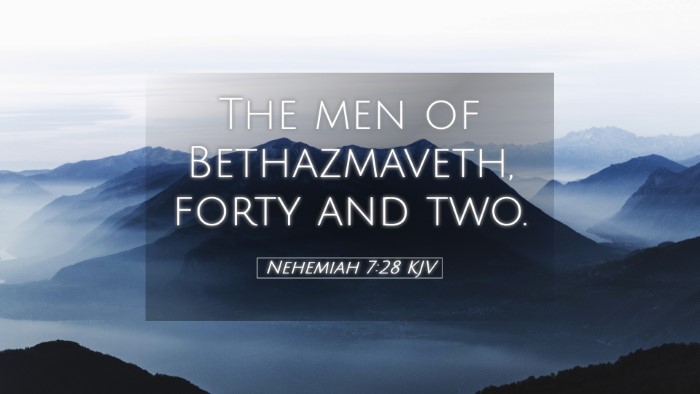Commentary on Nehemiah 7:28
Nehemiah 7:28 is a verse that falls within the broader context of Ezra and Nehemiah, depicting the restoration of the Jewish community after returning from Babylonian exile. It highlights the importance of organization and structure within the community, particularly concerning the genealogy of those who returned to Jerusalem and the establishment of their roles and identities.
Contextual Overview
The book of Nehemiah primarily focuses on the rebuilding of the walls of Jerusalem, but it also emphasizes the reconstruction of the community's spiritual and social order. Nehemiah takes a significant interest in the genealogies of the returning exiles, as this information was crucial for the re-establishment of the Jewish identity and heritage.
Exegesis of Nehemiah 7:28
In this verse, Nehemiah records another family that played a role in the restoration of Jerusalem. By documenting these names, he not only provides historical accuracy but also acknowledges the individuals and families that contributed to the collective identity of the Jewish people.
Insights from Matthew Henry
Genealogical Importance: Matthew Henry highlights the significance of genealogies in the Scriptures. He notes that they serve more than a historical purpose; they affirm God’s faithfulness to His promise to Israel, maintaining their identity as His chosen people. Each name represents a family that endured hardship and contributed to the rebuilding effort.
Spiritual Reflection: Henry points out that the gathering of these families reflects a spiritual restoration. As God restored His people, so too were the families restored to their rightful place in the community of faith.
Insights from Albert Barnes
Covenant Community: Albert Barnes emphasizes that the listing of the families symbolizes the covenant community. He notes that God had promised that their heritage would not be lost despite exile and oppression, and by recognizing these families, the shared history and commitment to God's covenant are reaffirmed.
Historical Accuracy: Barnes also emphasizes the importance of historical accuracy in these records. He argues that these genealogical details affirm the legitimacy of the restored Jewish community and serve as an example for the present-day church about the importance of maintaining a connection to history and heritage.
Insights from Adam Clarke
Restoration and Identity: Adam Clarke discusses the theme of restoration prevalent in Nehemiah's narrative. He suggests that the listing of families is not merely bureaucratic but is deeply tied to the restoration of Jewish national identity. Each name is a reminder of past faithfulness and an invitation to future commitment.
Community Involvement: Clarke emphasizes the participation of families in the restoration of Jerusalem. This involvement signifies that rebuilding was a communal rather than an individual effort, highlighting the significance of unity among the Jewish people in both the past and ongoing endeavors in faith.
Theological Implications
This verse and accompanying commentaries delve into significant theological themes such as:
- God's Sovereignty: The records illustrate God's sovereign control over history and His fulfillment of promises through generations.
- Community and Identity: The focus on families and genealogies reinforces the idea that faith is practiced collectively, stressing that individual faith exists within a communal identity.
- Heritage and Memory: The importance of remembering one’s heritage is paramount in both the Old and New Testaments. It reminds the faithful of God's ongoing work throughout history.
Application for Today's Church
The insights from Nehemiah 7:28 and the commentaries reflect several key applications for contemporary pastors, students, theologians, and scholars:
- Collective Memory: Churches should cultivate a sense of shared history and legacy, recognizing the importance of their collective identity as the body of Christ.
- Restoration: The process of spiritual and communal restoration remains relevant. Just as Nehemiah led the returnees, modern leaders must guide congregations in spiritual renewal.
- Community Engagement: Engaging families and the broader community in church life is vital; church activities should promote unity and a sense of belonging.
Conclusion
Nehemiah 7:28 is a verse that may seem simple at first glance but holds significant depth in understanding the restoration of God’s people. Through the insights of public domain commentaries, it becomes evident that the intricacies of genealogical records extend beyond mere lineage—they serve as reminders of God’s faithfulness, the importance of community, and the rich heritage of faith that binds believers across generations. As pastors, students, and theologians reflect on this verse, they are called to appreciate and uphold the collective identity and mission that God has entrusted to His people.


